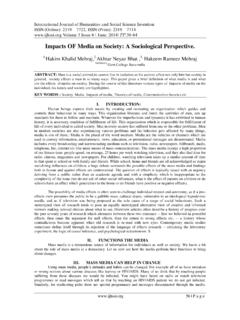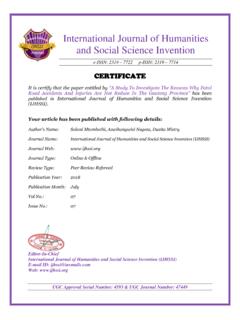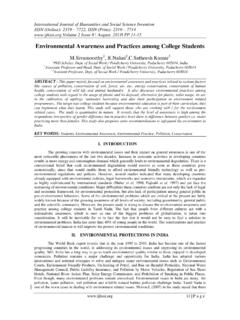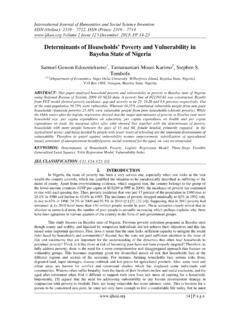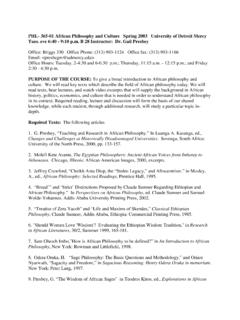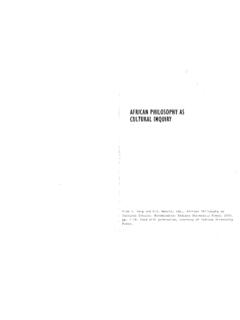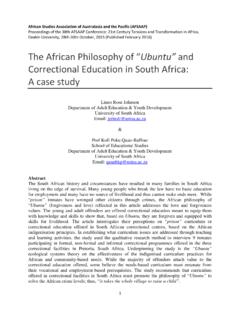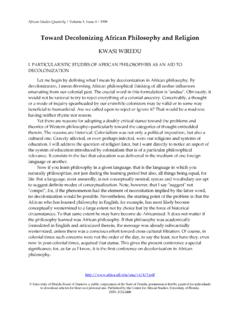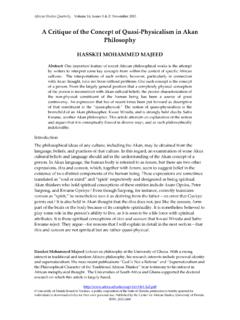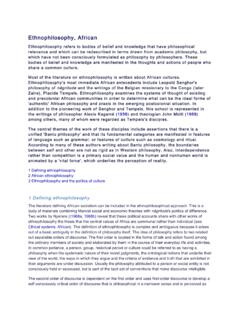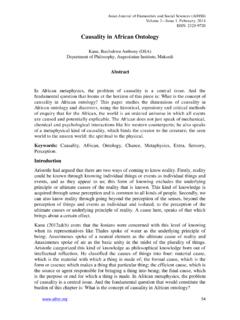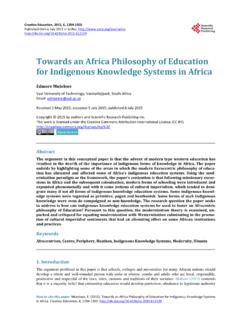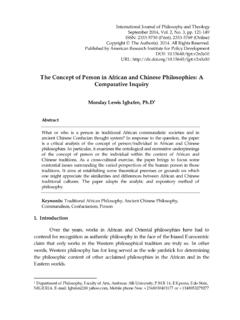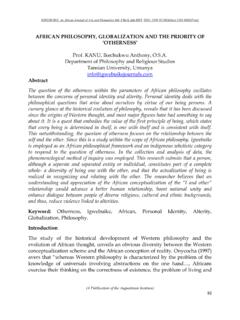Transcription of On the Ontology of African Philosophy - IJHSSI
1 International Journal of Humanities and Social Science Invention ISSN (Online): 2319 7722, ISSN (Print): 2319 7714 Volume 1 Issue 1 December. 2012 54 | P a g e On the Ontology of African Philosophy Francis E. Ekanem ( ) Faculty of Arts Department of Philosophy University of Uyo, Uyo ABSTRACT: Philosophy , a discipline as old as the human faculty of reason has its thrust on the good life for man. It employs the instrumentality of contemplation, reflection, analysis and criticism to arrive at truth. African thinkers tailor their thoughts towards addressing the lacuna in the schemata of things as it affects the general existential lives of her people.
2 African Philosophy has its orientation in communalism, as contra-distinguished from Western Philosophy which is individualistic in outlook. This is also reflected in the African and Western Ontology respectively. Our excursus in this work is to show the distinctive features of African thought process and its underlying influence as rooted in her culture and tradition. The work also attempts to highlight the effort put forward by African thinkers which has laid to rest the debate as to the existence of African Philosophy . Keywords Ontology , African , Philosophy , Communalism, Belief and Culture. I. INTRODUCTION The debate or controversy on whether there is an African Philosophy is dead and buried (Uduigwomen, 1995: ).
3 This is a very strong assertion that requires great evidence not just of talking about African Philosophy , but doing African Philosophy . It is on record that systematic philosophizing started in the Greek city of Miletus in Ionia. Though Philosophy is a universal discipline with its methods and approach, the bulk of literature available to us are from the Western world and it is particularly individual s thoughts with a scrupulously critical analysis of the ideas under discussion of various issues (Hallen, 2006: p. 3). Africa has a wide array of Philosophy richly embedded in her culture and tradition in oral form.
4 Odera Oruka, calls this philosophical sagacity. African philosophers have been labouring to elaborate African abstract beliefs and practices with travails for a long period now. But today, that effort has paid off as literatures in vast area of African Philosophy abounds. Western Philosophy seem to be the paradigm for doing academic Philosophy , however, comparative Philosophy can establish similarities in terms of thought processes of people in different climes. Hence, Philosophy is a universal discipline whose quest is to understand life which is common to all humans though with different approach and method.
5 This paper is an attempt to harp on the Ontology of African Philosophy while establishing the fact of the actualization of African Philosophy . II. African PHILOSOPHICAL THINKERS African Philosophy can be said to originally begin with Placide Tempels, a Franciscan missionary from Belgium who lived in the colonial era among the Bantu population of the Congo. His work, Bantu Philosophy , constitutes the first intuitive attempt and approach to the reality of African thought (Nkemkia, 1999: ). Africans found a new awareness of her personality and worth, once the identity crisis due to colonial rule was over. As free persons, a new era and a new horizon opened up in front of them; an age of speculation began.
6 From this moment onwards, Philosophy is no longer a means of affirming oneself in front of someone else. It became the art of wisdom, the effort to penetrate the truth on life and a means of giving an important contribution to the universal human thought. The first African thinkers were formed in Western schools and they specialized within Western thinking. We shall analyze the thoughts of some intellectuals who promoted African culture and in the process, did philosophize in the social and political field. III. KWAME NKRUMAH S CONSCIENTISM Kwame Nkrumah was among the early African heads of state that claimed independence and like everyone else, fought against colonial rule.
7 He was a revolutionary who affirmed that a revolution was necessary to bring a new awareness in an oppressed people of their tradition. This includes cultural values and a new consciousness of their proper identity and personality. Nkrumah (1964) opine that: On the Ontology of African Philosophy 55 | P a g e Social revolution must therefore have, standing firmly behind it, an intellectual revolution, a revolution in which our thinking and Philosophy are directed towards the redemption of our society. Our Philosophy must find its weapons in the environment and living conditions of the African people.
8 It is from these conditions that the intellectual content of our Philosophy must be created ( ). The Philosophy which has to give support to this revolution and which originates from it is what he designate, conscientism which incorporates the humanism of traditional society in this commitment. Nkrumah s conscientism is based on deductions derived from African human conscience traceable to the style of humanism and the communitarian conception of traditional Africa. IV. LEOPOLD SENGHOR S NEGRITUDE The negritude movement gave birth to an ideology elaborated among African intellectuals in Paris around (1933-1935).
9 They foster a complex of values found in the authentic African culture and called for a new awareness. Negritude is the whole of the values of civilization, cultural, economic, social and political which characterize the black people, more especially the Negro-Africa-world. It is essentially instinctive reason, which pervades all these values, because it is reason of the impressions, reason that is seized . It is expressed in the emotions, through an abandonment of self in identification with the object through the myth, by images and archetypes of the collective soul, especially by the primordial myth accorded to those of the cosmos.
10 In other terms, the sense of communion, the gift of imagination, the gift of rhythm are the traits of negritude that we find like an indelible seal on all the works and activities of the Blackman. (Rich and Anyanwu, 1984: ). V. JULIUS NYERERE S UJAMAA In Ujamaa , a treatise on African socialism published in April, 1962, in English, by Julius Nyerere in TANU Newspaper (the Voice of Tanganyika African National Union Party), one can find the formulation and basis of a typical African socialism. The author had in mind the conception of Western socialism and he considered it as being inadequate to cover the needs of an African lifestyle.


